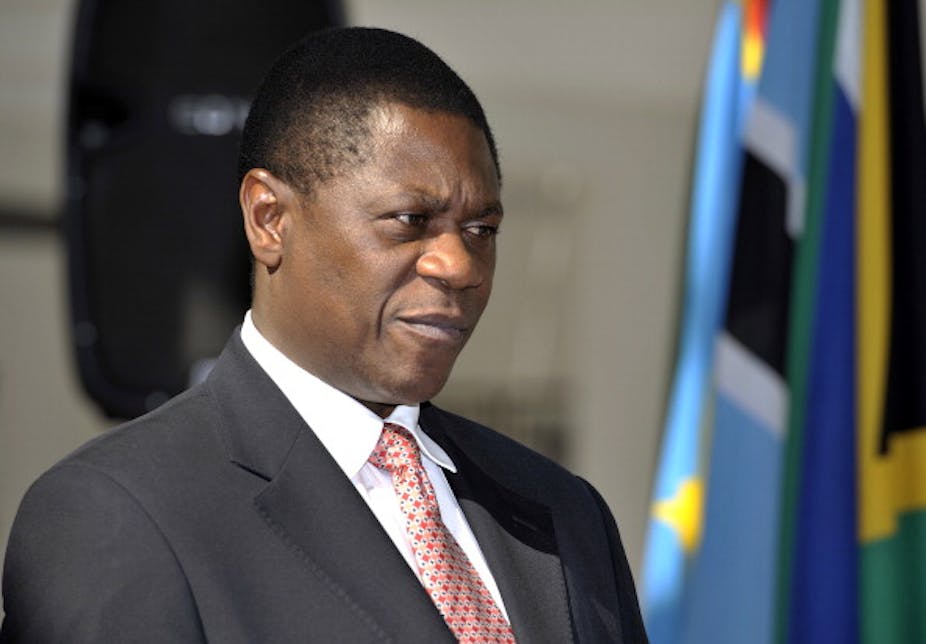In a recent cabinet reshuffle President Cyril Ramaphosa appointed Paul Mashatile, the deputy president of South Africa’s governing party, the African National Congress (ANC), as the country’s deputy president. The tradition in the ANC since democracy in 1994 has been for its elected deputy president to ascend first to the deputy presidency of the country, and eventually to become head of state. So Mashatile, an experienced politician, may also be destined for top office.
Ramaphosa’s cabinet reshuffle took place in a climate of growing restlessness across the nation about the many failures of the state, high levels of corruption and organised crime.
As a political scientist and researcher on security governance matters, I have been considering the role Mashatile could play in responding to the security crisis.
He will serve on two cabinet structures that are crucial to safety and security in the country. Through this he could contribute to rebuilding trust that the public has lost in the law enforcement and criminal justice system.
Justice, crime prevention and security
One of Mashatile’s tasks is to chair the Justice, Crime Prevention and Security cabinet committee. This committee coordinates the work of the ministers who are collectively charged with ensuring safety and stability in the country. During the devastating July 2021 unrest, the ministers contradicted each other. They also failed to show a united front against the violence that engulfed several provinces, particularly KwaZulu-Natal and Gauteng.
With deft leadership, Mashatile can assist Ramaphosa to address the legacy of poorly coordinated security services. The former minister in the presidency, Mondli Gungubele, acknowledged this problem on the anniversary of the deadly July 2021 riots.
Read more: South Africa has a new deputy president in Paul Mashatile: what he brings to the table
The Justice, Crime Prevention and Security cluster was among several cabinet “clusters” established during former president Thabo Mbeki’s tenure. This has cemented a tradition of intergovernmental cooperation ever since. It oversees the work of the following core ministries and departments:
police
state security
justice and correctional services
home affairs
defence and military veterans
finance.
Mashatile will have to contend with a labyrinth of structures responsible for safety. The operational work of the cluster is coordinated by the directors-general of these departments through the National Joint Operational and Intelligence Structure (NATJOINTS).
While the NATJOINTS operates at national level, its activities are decentralised to provincial structures (PROVJOINTs). They coordinate security operations at a provincial level. They work with municipal law enforcement and emergency services, and advise the provincial governments on measures they are taking to keep the public safe.
The National Security Council
Mashatile will also serve on the National Security Council, which is chaired by the president.
The entity is mandated to coordinate a national security strategy. It also oversees the annual formulation of a budget and priorities by the country’s intelligence services. It is responsible for coordinating the work of the security services, law enforcement agencies and relevant organs of state to ensure national security. In addition, it receives coordinated, integrated intelligence assessments from the national security structures, and mandates these structures to attend to matters of national security as required.
There is a significant overlap of the membership of the Justice, Crime Prevention and Security cluster of ministers, and the National Security Council. Besides the president and deputy president, the council includes all the ministers who are part of the Police, State Security and Justice cabinet committee, as well as the ministers of home affairs, defence and military veterans, international relations, and cooperative governance and traditional affairs.
How Mashatile could bring stability
Ramaphosa has entrusted important functions to his deputy. This suggests a level of confidence and cooperation between the two men, rather than a rivalry. Neither can afford to let the ANC fail in government, as this would augur badly for its prospects in the 2024 general elections.
Mashatile should prioritise getting a few key systems in place. The visibility and effectiveness of the police in day-to-day policing must improve. He must oversee strategies to combat organised crime, which is strangling so many areas of public life. He must also work to secure the resources to implement the recommendations of the Zondo Commission on state capture.
With confidence in the state as low as it is, and the public deeply traumatised by high levels of violent crime, Mashatile must put in extra effort to boost public confidence in the justice, crime prevention and security sector.
He can do this by listening to what key stakeholders have to say about the security of the country. Young people bear the brunt of the epidemic of violence – physical and structural. Attending to their security and wellbeing is crucial for the country’s future.
He also needs to be more strategically visible than his predecessor, David Mabuza, who resigned from the position. Mabuza’s job description was almost identical to that of Mashatile’s. Yet he left office with many questioning if he had made any impact.
New broom
Mashatile could be the new broom that sweeps clean. Ramaphosa’s apparent confidence in him suggests that he has some latitude to do so.
It is said the job of a deputy president, in practically any country, is waiting to replace the president. While Mashatile waits in the wings, he has the opportunity to make a difference and make South Africa a more secure place for the public.

